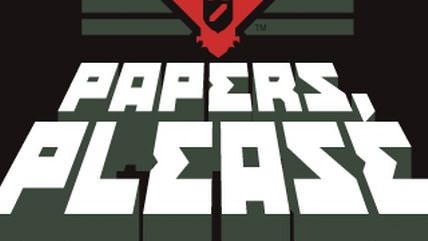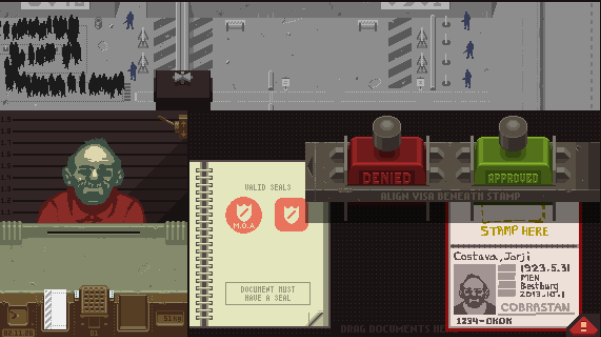Papers, Please, Politics in Games, and the Growth of Indie Development: An Interview with Lucas Pope
The surprising success of a video game about checking paperwork


"A video game where players check the legitimacy of people's immigration paperwork" sounds like some horrid concept a Department of Homeland Security employee might come up with as a way to funnel some of the agency's public relations budget to a crony in the gaming industry.
But in August, a little indie game called Papers, Please charmed the pants off reviewers and players with exactly that pitch. The game puts the player in the role of a customs official at the border of an oppressive Eastern European country during the cold war of the early '80s. The player must analyze the paperwork of each person attempting to get through the checkpoint into your homeland, the fictional country of Arstotzka. If the paperwork is accurate, they're good to go. If not, well, sorry. The player is pushed to do the best he can because he's paid according to how successful he is at properly sorting who is and isn't allowed into Arstotzka. Failure means fines. At the end of each day, the player returns home to ration the pittance he's earned on food, rent, heat and sometimes medicine for his family. Fail to bring home enough pay and they can die off.
As the game progresses, the paperwork game grows more and more complicated. Soon passports aren't enough. Additional documents like work visas, entry permits, and immunization records are tossed at you to examine. Diplomats have their own papers, as do those who seek asylum (yes, apparently some of the other nearby countries are even more oppressive). If an immigrant's face doesn't match his or her document picture, then you have to check fingerprints. If his weight doesn't match what's listed or his gender doesn't match, then you have to subject him to a humiliating (for both of you) strip search to make sure he's not smuggling in contraband. And it's all timed, so the more papers you're given, the less time you have to review. Every mistake you make is revealed by a citation from a dot matrix printer in your station that tells you what you missed. Eventually, every approval or denial is followed by seconds of tension while the player waits in dread for the sound of that printer. Silence is a relief.
Interwoven through this process-oriented gameplay are brief little stories surrounding the people with whom you interact. The relentless complications of the ever-shifting paperwork demands affect the travelers as well as yourself. Doing your job perfectly may result in you breaking up families or detaining a person trying to smuggle in medicine. You will be offered bribes. You will be recruited by terrorists looking to liberate the country. You will deal with government corruption. The game has many possible endings, depending on your choices. Many of them are very unpleasant.
The game is the creation of a single man, Lucas Pope. Though Pope has a background in working on major studio games, this was an indie labor of love. As the game took off, Reason contacted him for an e-mail interview about his game's success, the growth of independent game development, and bringing political concepts and messages into game design.
Reason: Could you give us a quick biography of yourself?

Lucas Pope: I've been making games since leaving college ages ago. I started working at a small studio started by me and a few friends. We survived for a while but eventually ended up going our separate ways. From there I ended up at larger studios, including Naughty Dog during the Uncharted 1 and 2 years. Contributing to AAA projects was great but I've always had a mind on smaller, more experimental games. A few years ago I left the big leagues to focus on these kinds of games.
Reason: What inspired you to make a game out of the process of checking border paperwork?
Pope: I'm an American living in Japan and pass through international airport immigration a couple times per year. After a few times of this, I paid extra attention to what the immigration inspector was doing. The shuffling of papers and documents/computer screen correlating looked interesting and I thought there could be a fun game there. Thinking about it more, I was excited by the idea of approaching this subject from a non-traditional direction. In popular media you've always got the hero spy sneaking through checkpoints but wouldn't it be cool to play the guy on the other side? Instead of letting the super-spy slip through, you can be the one to throw him in prison.
Reason: Your game has gotten a lot of attention. Were you expecting this response? Can you reveal how many copies you've sold so far?
Pope: I wasn't expecting this response at all. Papers, Please was intended as a small experimental project that I'd finish off before working on something more marketable. I'm extremely happy with the overwhelming response it's gotten. I'll be posting a devlog update with actual sales numbers soon but for now I'll say it's sold wildly beyond my expectations.
Reason: Why do you think the game has gotten as much attention as it has? Have you been surprised by anything that's been said about the game?
Pope: I think the uniqueness of the game has probably helped it get attention. It's impossible to describe the game to somebody in a way that makes it sound exciting but at least it's different enough from most other games to warrant a second look. One thing that surprises me is how players express their loyalty to Arstotzka. This is the oppressive communist regime that, although mostly well-intentioned, tightens the screws on the player throughout the whole game.
Reason: This is not the only game you've created that uses an oppressive government as a setting. What draws you to that sort of environment?
Pope: Outside of games, I find oppressive/dystopian worlds interesting settings for fiction. For games, the rigid structure of an oppressive bureaucracy works really well with how I like to design game mechanics.
Reason: You've mentioned in other interviews that you weren't really trying to send a particular political message with your game. Yet, certainly the player will definitely feel the impact of living in an "iron curtain" society no matter the choices he or she makes. How do you balance making a game that's entertaining to play while still creating an appropriately dark mood?
Pope: I tried to generalize the political messages to not just be about one situation or regime. Instead, I wanted to include elements that could apply to broad situations where it's not always a simple good/evil dynamic at play. As for construction, I developed the game from the bottom up. Only once I had the core mechanics of document checking working well did I start to think about a narrative to tie everything together. This narrative informed a few additional features but I always kept a focus on supporting the core gameplay. I knew the game was going to deal with fairly heavy subjects so for levity I tried to include more lighthearted encounters and individuals; something like what I imagine real inspectors deal with.
Reason: The independent game development market feels right now kind of like the independent music market in the '90s. There's such a huge cultural interest in it among gamers. Where do you see it going in the future?
Pope: I think games are growing quickly as a legitimate form of expression like movies, books, art, etc. As it gets easier to make games, and as people who grew up playing video games their entire life mature, we'll see more and more varied stories being told this way. And because games are interactive, I think the potential to affect others will be much stronger with games than with other media.
Reason: What would you suggest to an indie game developer who wants to weave political or social issues into a game?
Pope: My advice is to focus on the gameplay and integrate it with the message as closely as possible. Don't tell or show something when you can make the player do it themselves instead. For me, this is the power that interactive games have over other media. You can put the player in exactly the situation you want to share and their connection with the message will be more powerful.


Show Comments (15)